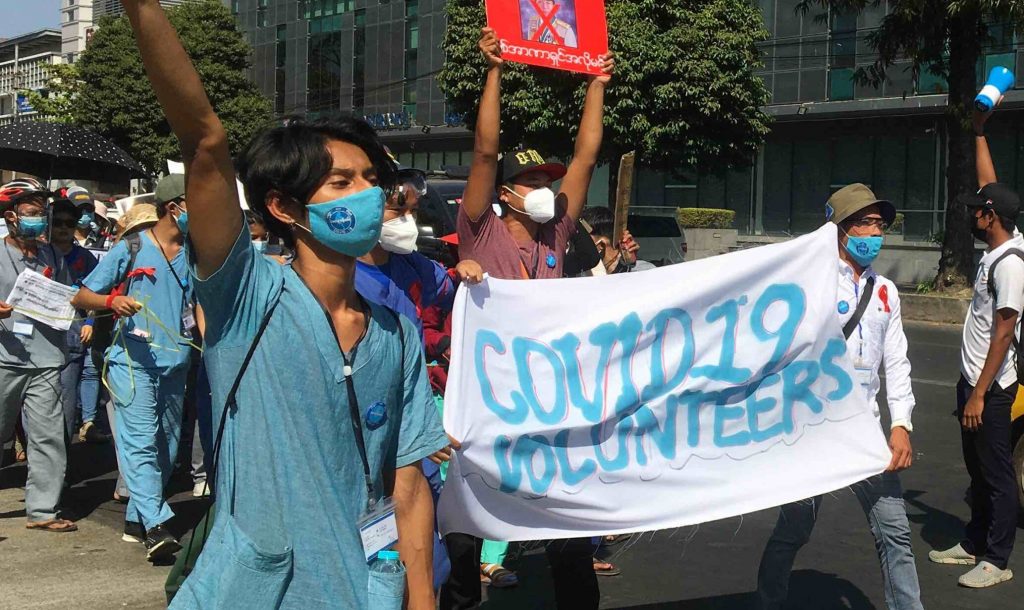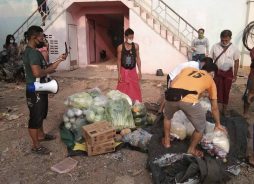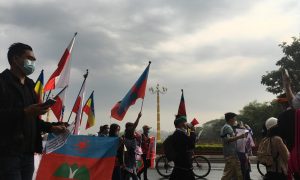Registration is now available for the 2021 ANU Myanmar Update conference, ‘Living with the Pandemic and the Coup’ (15-17 July 2021).
REGISTER HERE
The Myanmar (Burma) Update is a major platform for cutting-edge scholarship on political, social and economic affairs in Myanmar. Now in its third decade, it is one of only two longstanding, regularly held international conferences on the country, and is alone in routinely publishing papers presented at the conference. This year’s update brings together a diverse list of experts who address the many social issues that have emerged from both the pandemic and the coup, and their long-term consequences for the country.
For those who have not been closely following #whatshappeninginMyannmar, Dr Justine Chambers has put together a brief backgrounder for our readers.
On 1 February 2021, Myanmar’s military (the Tatmadaw) launched a coup d’etat, detaining the country’s leader Aung San Suu Kyi, President Win Myint and other members of the National League for Democracy party, which had won elections by a landslide only three months prior. After ten years of ushering through a reform process that they had overseen through special privileges afforded to them in the 2008 Constitution, the military took over the country’s civilian and governance wings on February 1, alleging widespread electoral fraud. Shocked by the move, millions of people soon took to the streets, demanding an end to military rule, the release of political prisoners and the restoration of democratic rule.
From the busy commercial capital Yangon to the isolated hills of Chin State, a widespread Civil Disobedience Movement soon spread across the country, paralysing banks, hospitals, transportation, education and other sectors of the government, as civil servants refused to work for the newly established junta, the State Administration Council. Using ever more creative strategies to humiliate and shame the junta, Generation Z were at the forefront of the movement, spreading satirical memes, singing songs, painting murals and hanging women’s longyis, as a rebuke to patriarchal norms. What began as jubilant scenes of mass protest led by these tech-enabled and meme savvy young women and men, however, soon descended into scenes of sheer horror and violence, as Myanmar’s security sector brutally cracked down on the largely unarmed protestors.
With video footage of extra-lethal violence quickly circulating around the Internet, and a mounting civilian death toll (including children), calls for help from the United Nations invoking the ‘responsibility to protect (R2P)’, became visible throughout rallies. Some hoped that with Biden in the White House strong moves from the US and Europe might encourage some kind of intervention. However, it soon became apparent that beyond condemning the actions of the regime and applying some “targeted sanctions”, there was very little appetite amongst Western powers for taking any other concrete actions against the military leaders. In a textbook example of ASEAN-style diplomacy, initiatives from the regional body to stop the bloodshed, de-escalate tensions and restore “democracy” to the country also proved ineffectual.
In limbo: Migrant workers struggle with the Myanmar coup and COVID-19
As their travel documents expire Myanmar migrants risk becoming undocumented and excluded from legal protections by shortcomings in both Myanmar and Thai migration policies.
Armed by Russia, and supported by neighbouring countries, including China, the Tatmadaw’s response to the anti-coup movement has been predictable. Adopting methods long used in borderland ethnic states, the military has used indiscriminate violence, air and ground attacks, and attempts to cut off supplies for food, water and medicine to displaced civilians. State terror, torture and wanton violence has also been deployed throughout the country, consolidated through juridical instruments and institutions, with many journalists, researchers and civil society activists now detained, dead or in hiding.
The level of human tragedy waged by the coup has been so great as to occasionally overshadow the fact that Myanmar, like the rest of the world, is still in the throes of a devastating pandemic. Health care workers, who have been at the front lines of both the anti-coup movement and the COVID-19 response, are bitterly embattled on all sides. Regional COVID-19 mitigation measures have led to the shutting of Myanmar’s borders and the rapid contraction of its economy, bringing forth bad reminders of a more isolated era in Myanmar’s not-so-distant past—even without the added stress of February’s coup. After a decade of 7 per cent annual growth, reduced poverty and a significant increase in international investment, the coup has also paralysed the economy, with the UNDP warning that nearly half of Myanmar’s population will be living below the poverty line by early 2022.
While it appears that the military has not changed much over the last decade, the country and its people certainly have. And it has certainly underestimated its citizenry. Indeed, as documented by authors in the recent Myanmar Update volume, Living with Myanmar, while there were many deeply entrenched obstacles to reforming the country, there were equally as many people working tirelessly on the ground to move things along. The opening of political space afforded by Myanmar’s changes over the last decade saw a blossoming of civil society networks around various issues, which have now come to the fore of the pro-democracy movement—including the need for gender equality, labour rights and better representation for ethnic nationality communities.
Spearheaded by Generation Z, ethnic activists and other known critics of the NLD government, one of the more interesting dynamics to emerge out of the coup is that the fight against the military has become a fight for rebuilding a more united and inclusive Myanmar—establishing a ‘real federal union where all citizens, all ethnicities are treated equally’. Not only has the coup highlighted the fragile nature of the previous power-sharing arrangement between the civilian government and the military, but it has brought to the fore the work of the many activists that the National League for Democracy (NLD) government also mostly tried to silence and ignore. For many of those people now guiding the recently established National Unity Government (NUG) there is no returning to the status quo, including on key issues like recognition of the Rohingya and on the goal of establishing a genuine Democratic Federal Union. As Kachin activist Stella Naw observes in a recent article, if “there is a silver lining” to the coup, it is that it has brought together “people from all walks of life, across ethnic and religious lines”.
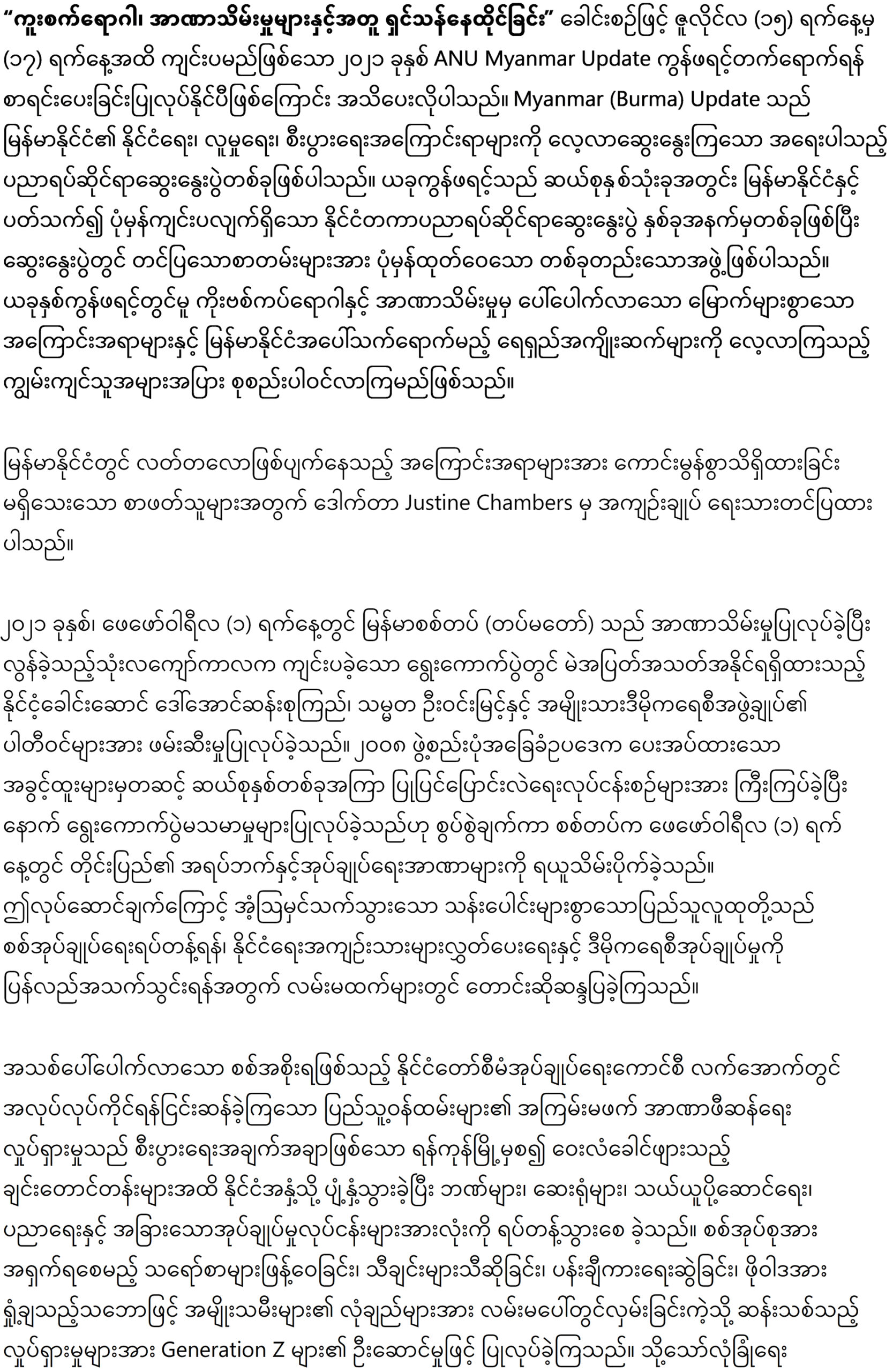
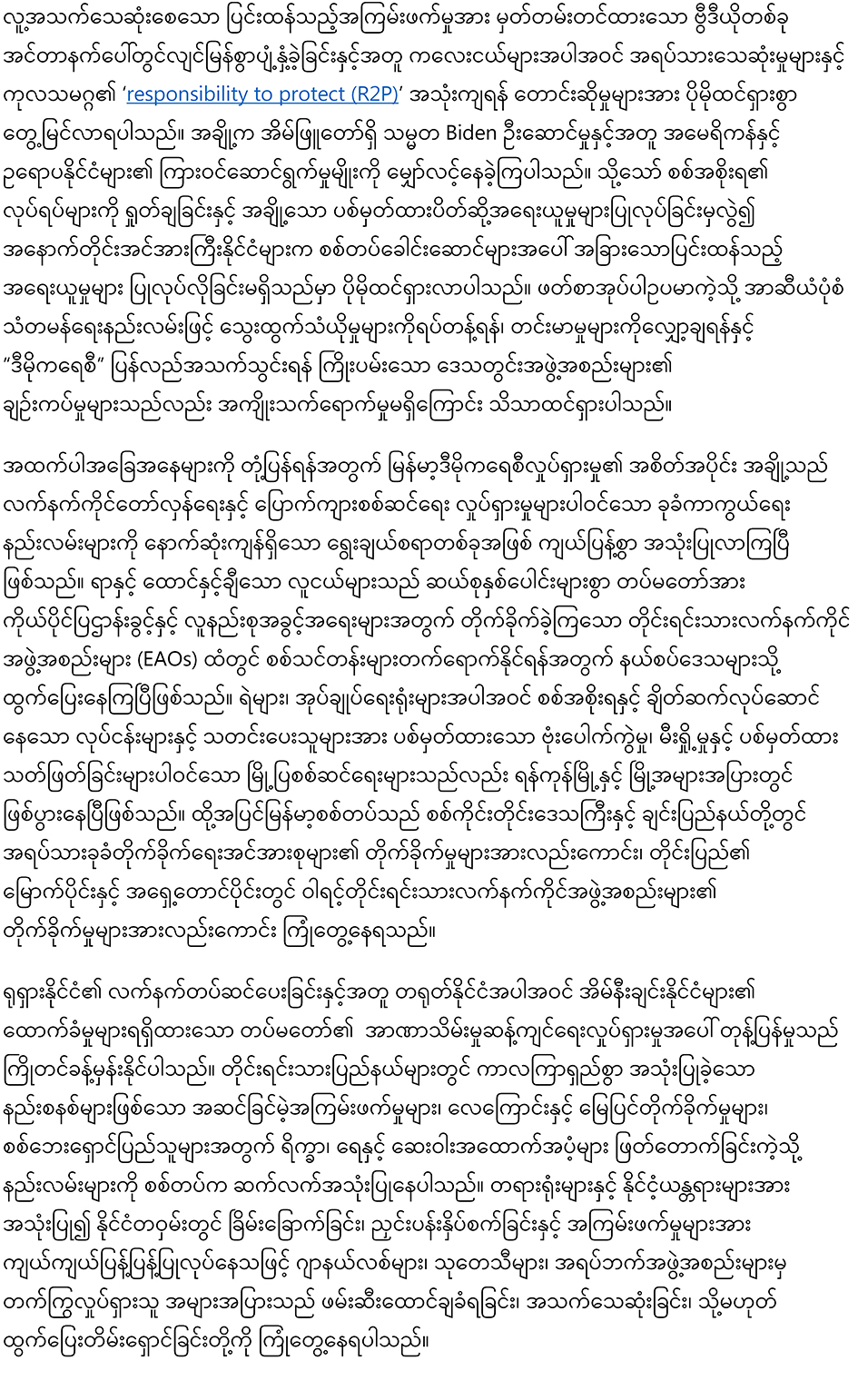
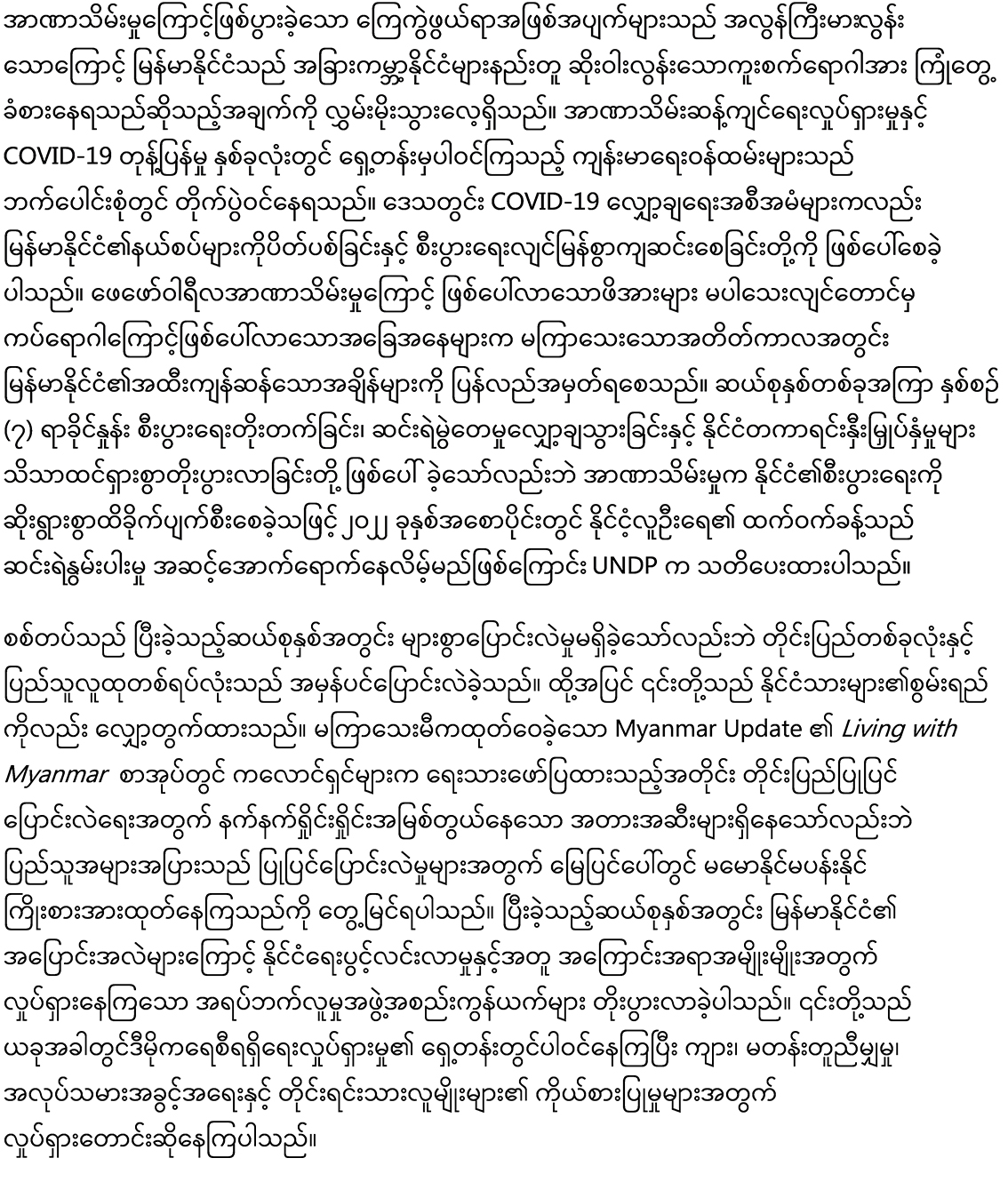
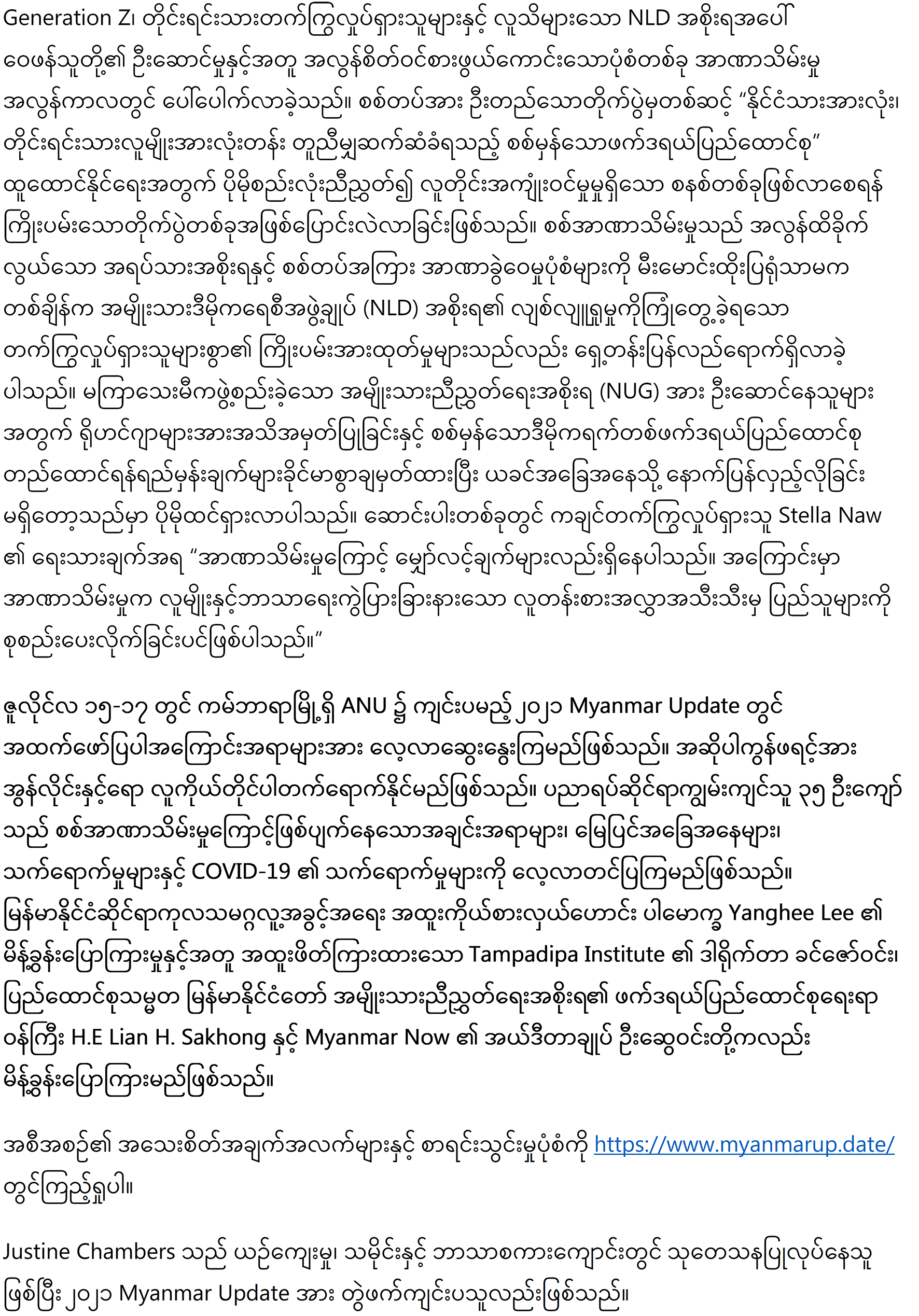
 Facebook
Facebook  Twitter
Twitter  Soundcloud
Soundcloud  Youtube
Youtube  Rss
Rss 